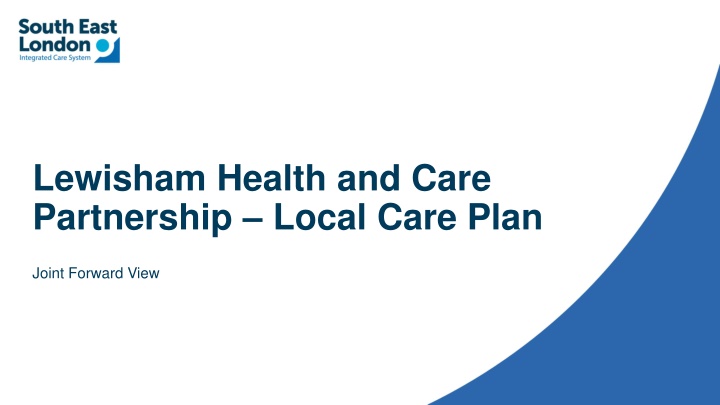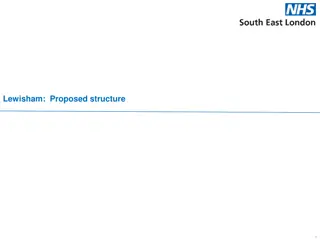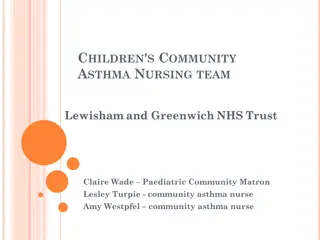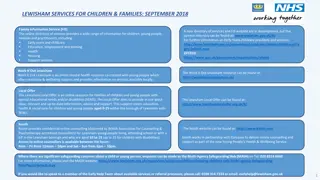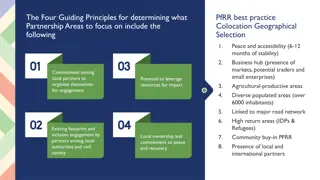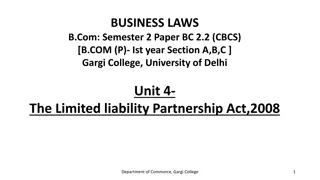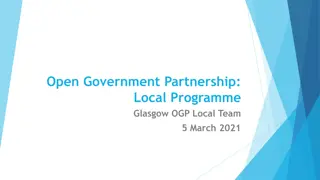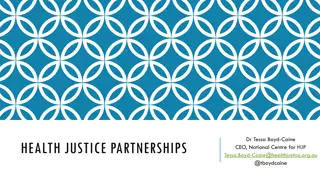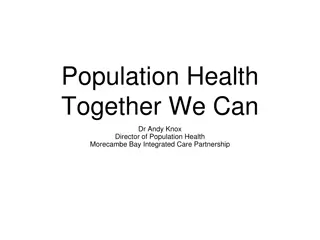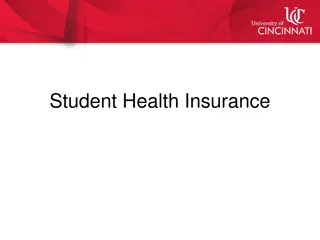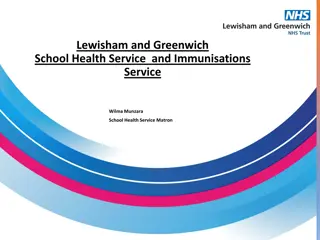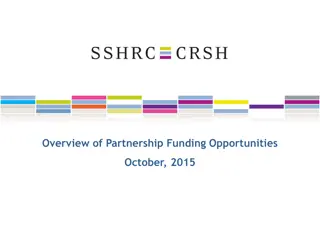Lewisham Health and Care Partnership – Local Care Plan
The Lewisham Health and Care Partnership aims to improve the health and well-being of the local population through collaborative efforts. With a focus on key priority areas, the partnership addresses existing health inequalities and aims for substantial improvements in health outcomes. Lewisham's diverse population faces challenges such as higher prevalence rates of certain health conditions and inequalities in access to services. Efforts are being made to address these issues and enhance overall health and care services in the borough.
Download Presentation

Please find below an Image/Link to download the presentation.
The content on the website is provided AS IS for your information and personal use only. It may not be sold, licensed, or shared on other websites without obtaining consent from the author.If you encounter any issues during the download, it is possible that the publisher has removed the file from their server.
You are allowed to download the files provided on this website for personal or commercial use, subject to the condition that they are used lawfully. All files are the property of their respective owners.
The content on the website is provided AS IS for your information and personal use only. It may not be sold, licensed, or shared on other websites without obtaining consent from the author.
E N D
Presentation Transcript
Lewisham Health and Care Partnership Local Care Plan Joint Forward View
Introduction The Lewisham Health and Care Partnership brings together representatives from local organisations and groups who are committed to working together to ensure that the people of Lewisham live happier and healthier lives. Lewisham s Local Care Plan sets out our direction of travel as a partnership and outlines the priority areas on which we will focus over the next 1 5 years. As part of the South East London Integrated Care System (ICS), our local priorities align with the high level priorities set out the ICS strategy and with the priorities outlined in the ICB s Joint Forward View. We have identified four priority areas which we will use to judge the success of our partnership working and through which we aim to achieve a substantial improvement in health and care outcomes and address existing inequalities. These four priority areas sit alongside existing partnership activity, including that around Mental Health, Urgent and Emergency Care, and Children s Community Health Services. We recognise that the way in which we work together is critical to our success. We have therefore signed up to a set of guiding principles and shared behaviours. In our work we will be open and transparent, collaborative and constructive, and supportive to others in everything we do. The principles will guide the delivery of our plans. 2
Lewisham borough Our population Lewisham currently has a population of 300,600. It is the 14th largest borough in London by population size and the 6th largest in Inner London. In the next five years our population is likely to rise to over 310,000 and to over 320,000 by 2032. 52.5% of the population are female; 23.5% 0-19 years of age; 9.5% aged 65 or over; 67% 20-64 years of age. The population of very young children aged 0 4 is larger in Lewisham than in England. We have a significantly younger population compared with national averages, with more people aged between 25 and 44. There is a smaller population of those aged 65+. However, it is thought our population growth won t be evenly spread across the ages and we will see an increase in the older population and a slight decrease in the younger population and working age population. Almost half (48.3%) of our population are from an ethnic minority community. Between 2011 and 2031 it has been projected that the size of the population of children and young people 0-19 in ethnic minorities will grow much faster than the rate of children from white ethnic groups Health outcomes for our population Inequalities within our borough For female residents, Lewisham life expectancy (83.2 years) now exceeds the national average (83.1). However for male residents, life expectancy is significantly lower (78.8) than the national average (79.4). Lewisham is the 63rd most deprived Local Authority in England and within the 20% most deprived Local Authorities in the country. Bellingham, Downham, Rushey Green and New Cross are the most deprived local wards in the borough. Lewisham s Black and Minority Ethnic communities are at greater risk from health conditions such as diabetes, hypertension and stroke. In addition, Black, Asian and Minority Ethnic populations have higher prevalence rates of some mental health conditions, including psychotic disorder and Post-Traumatic Stress Disorder (PTSD), and experience inequalities in access to services. In borough we also see late presentations of lung and colorectal cancers. The main cause of death in Lewisham is cancer (28%), followed by circulatory disease and respiratory problems. Lewisham has lower average mental health scores than London or England. Just over 8% of adults in Lewisham have a recorded diagnosis of depression. This is higher in than in London (7.1%). According to the 2020/2021 ONS Annual Population Survey, 29% of Lewisham residents age 16+ reported high anxiety levels, compared to the London average of 24%, and 24% across England. Those in poorer health were disproportionately impacted by Covid. For some services, including the uptake of preventative healthcare such as health checks, immunisations and certain cancer screening, Lewisham is still to return to pre-pandemic levels. This is concerning in Lewisham, which even prior to COVID-19 was already seeing lower uptake and long-standing health inequalities such as notable differences in life expectancy depending on the area of the borough a resident lived. We are seeing an increase in the complexity of need and those needing care and the number of people living with multiple health conditions is increasing.
What weve heard from the public Lewisham Health and Care Partners have engaged with stakeholders on the development of this local care plan. Through this engagement, the following common themes emerged. 1. The need to develop a truly integrated way of working across the local system and within neighbourhoods. 2. The need to provide timely and relevant care to children and families at their time of need that is truly person-centred and helps reduce inequalities in access. 3. The need to take a broad lens to access and inequality to better understand what the drivers are and how to address them 4. The need to ensure services are delivered by a happy, healthy workforce and recruitment and retention prioritised. To support the delivery of this plan, Lewisham has committed to a new, co-designed model of engagement. The model will : Support local people to exercise power and contribute as equal partners. Build trust by acting on feedback and developing deeper relationships with local people. Reduce barriers to engagement (for example language barriers, resource barriers and cultural barriers). Work together to achieve more with what we have (recognising funding/time/capacity limitations). Our LHCP people s partnership will sit alongside and feed into the broader structures of the Lewisham Health and Care Partnership (LHCP) bringing patient and citizen voices and lived experience into supporting the strategy and delivery work of the LCP 4
Our key objectives - what we want to achieve over the next five years We are committed to achieving a sustainable and accessible health and care system to better support people to maintain and improve their physical and mental wellbeing, to live independently and to have access to high quality care when needed. Our plan supports the aims of Lewisham s current Health and Wellbeing strategy which are: 1. To improve health by providing a wide range of support and opportunities to help adults and children to keep fit and healthy and reduce preventable ill health. 2. To improve care by ensuring that services and support are of high quality and accessible to all those who need them, so that they can regain their best health and wellbeing and maintain their independence for as long as possible. 3. To improve efficiency by improving the way services are delivered; streamlining pathways; integrating services, ensuring that services provide good quality and value for money. Our plan also aligns with our commitment to make Community Based Care: Proactive and Preventative By creating an environment which promotes health and wellbeing, making it easy for people to find the information and advice they need on the support, activities, opportunities available to maintain their own health and wellbeing and to manage their health and care more effectively; Accessible By improving delivery and timely access when needed to planned and urgent health and care services in the right setting in the community, which meet the needs of our diverse population and address inequalities. This includes raising awareness of the range of health and care services available and increasing children s access to community health services and early intervention support. Co-ordinated so that people receive personalised health and care services which are coordinated around them, delivered closer to home, and which integrate physical and mental health and care services, helping them to live independently for as long as possible. 5
Our priorities Going forward, our four priority areas for specific partnership focus and action are: 1. Strengthening the integration of primary and community based care and achieving financial sustainability across the system by working together and in collaboration as organisations and with the communities we serve. 2. Working to build stronger, healthier families and providing families with integrated, high quality, whole family support services. 3. Addressing inequalities throughout the Lewisham health and care system and tackling the impact of disadvantage and discrimination on health and care outcomes 4. Being a compassionate employer and building a happier, healthier workforce by creating a range of employment opportunities for local people and creating an environment that fosters wellbeing in our staff. 6
Our programmes We aim to deliver a substantial improvement in health and care outcomes within our four priorities. These four new priority areas sit alongside other established programmes of work, including all age mental health, planned care and long term condition management, urgent and emergency care and children s community health. Delivery of our plan is managed by the partnership s programme boards and associated delivery plans. These include the Family Hubs and Start for Life Programme, the Older People and Frailty Programme, the Mental Health Alliance and the Integrated Neighbourhood Network Alliance. Other programmes of work, including those on planned and unplanned care, workforce and estates also contribute to the achievement of our strategic aims and priorities. The success of our partnership working and the progress we make against our agreed programme and delivery plans will be overseen by our partnership boards and health and care alliances. We are also establishing a joint programme management approach to provide Lewisham Health and Care Partners with the assurance that our partnership programmes are being delivered effectively and to time and budget. 7
Our objectives Our key objectives - what we want to achieve over the next five years Lewisham remains focused on the recovery and stablisation of our local health and care system. As partners we have committed to work in partnership on the following objectives to achieve a substantial improvement in health and care outcomes, address existing inequalities, and to achieve financial stability. 5. Working together to achieve financial sustainability 3. To address inequalities throughout Lewisham health and care system 1. To strengthen the integration of primary and community based care 2. To provide families with integrated, high- quality, whole-family support services 4. To maximise our roles as Anchor Organisations We want to create a range of employment opportunities for local people and create an environment that fosters wellbeing in our staff. We want to create more entry level roles and contribute to wider local economic development. We want to deploy resources more effectively and creatively to help address employment gaps. We want to tackle the impact of disadvantage and discrimination on health and care outcomes and we will contribute fully to the delivery of the Lewisham s Health Inequalities and Health Equity Programme s objectives which includes improving system leadership and accountability for health equity; empowering communities; identifying and scaling up what works; and prioritising and implementing specific opportunities for action from the Birmingham and Lewisham African Caribbean Health Inequalities Review (BLACHIR) The ongoing financial constraints are an impetus for change and we want to work together to overcome the financial hurdles ahead. We want to design, plan and deliver our services with service users and our local community. We want teams to work as close to the patient as possible and for services to be delivered through integrated multi-disciplinary approaches with organisational barriers no longer getting in the way. We want to join up services and ensure all parents and carers can access support they need when they need it. By working more closely and smartly we want to alleviate the pressure on services across the system enabling our budgets to be stretched in ways that support effective service delivery. We want to support and empower parents and carers in caring for and nurturing their children and to enable all children and young people to thrive. We want to improve the health and wellbeing of everyone who works for us. 8
Our priority actions As partners we will take the following priority actions in support of our objectives. More detail on these actions are set out in the following pages and in LHCP s programme and delivery plans. Our priority action is to establish the model, infrastructure and approach required to establish effective integrated working at a neighbourhood level. Through this approach we will establish local models of care for at least two long term conditions and to support older people. We will also expand the provision of early intervention and community support for mental health. Strengthening the integration of primary and community based care Providing families with integrated, high-quality, whole- family support services Our priority action is to establish the integrated model for family hubs across Lewisham and to identify the integrated pathways that can be delivered through family hubs. Addressing inequalities throughout Lewisham health and care system Our priority action is to build and implement an agreed infrastructure through which initiatives to address health inequalities and achieve health equity in the borough can be delivered. Our priority action is to identify opportunities for joint apprenticeship programmes. We will also implement joint initiatives to promote health and care careers and develop tools and approaches to inform workforce planning and address workforce. Maximising our roles as Anchor Organisations In partnership we will work to optimise the use of resources, align our financial planning and maximise financial resilience to system pressures. Achieving financial sustainability 9
Strengthening the integration of primary and community based care Integrated Neighbourhood Networks Through our Integrated Neighbourhood Network programme we will build on existing work across the partnership to improve the delivery and integration of community based care at a neighbourhood level and will establish the model, infrastructure and approach required to deliver integrated neighbourhood working . How we will secure delivery Intended outcomes in 5 years time Hold series of workshops to codesign the vision for neighbourhoods and phased approach to implementation, including digital and estates requirements Embed Health Equity Programme and Wellbeing Teams within Neighbourhoods Analyse Lewisham s population health and care data to identify neighbourhood priorities Review Standard Operating Procedures for multi-disciplinary working Identify and mprove opportunities for signposting across neighbourhoods Strong Neighbourhood Alliance(s) in place Integrated and coordinated neighbourhood teams in place Personalised health and care services coordinated around population needs Improved local awareness of services available Established social prescribing networks that support the needs of the Lewisham population Improved and timely referrals between services Effective multidisciplinary working/teams in place following best practice Actions for 23/24 Review impact of 23/24 actions Update PCN data profiles Update neighbourhood plans to address priorities identified from data profiles Undertake evaluation of social prescribing platform Undertake evaluation of Waldron refurbishment and use by community Actions for 24/25 10
Strengthening the integration of primary and community based care Older People s programme In partnership we will establish the model of care for Older People with an emphasis on Proactive Care How we will secure delivery Intended outcomes in 5 years time Develop, launch and embed the model of care for Older People through: Holding a series of workshops bringing together colleagues across the sector Ongoing engagement with professionals through fortnightly professionals group Active engagement with residents and Unpaid Carers Continue to build on learning from the frailty pilot and models in other areas Actively engage with regional and national colleagues Use the Population Health management approach to build the evidence base for the programme An established model of care for older people is in place which specifically addresses: Proactive Care, Admission Avoidance, Integrated Discharge and Intermediate Care for this cohort A reduction to best benchmarked peer borough in unplanned admissions and attendances for Older People An increased proportion of Older Adults remaining at Home. This will result in a reduction in patients admitted to care homes Actions for 23/24 Review impact of all 23/24 actions Evaluate impact on costs and outcomes of different models of support for Older People with moderate care needs through collaboration with LSE colleagues Increase Older Adults participation in community via social prescribing Actions for 24/25 11
Strengthening the integration of primary and community based care Long Term Condition management In partnership we will establish models of care for the management of Long Term Conditions at a neighbourhood level. How we will secure delivery Intended outcomes in 5 years time Review the Lewisham datasets for Long Term Conditions (LTC) including understanding our most prevalent conditions and patient locations across the borough. Examine existing pathways to maximise efficiencies and reduce duplication across system to release funding for investment Develop clear pathways from Primary, Community and Secondary Care Reduce the number of referrals for diagnostic procedures in secondary care as a result of activity being delivered in the community / early intervention. Reduction in the number of people living with unidentified LTCs. Delivery of services and management of care for people with long-term conditions that are proactive, holistic, preventive and patient-centred. Patients have an active role with collaborative personalised care planning at the centre of everything we do. Clinicians and patients work together using a collaborative process of shared decision-making to agree goals, identify support needs, develop and implement action plans, and monitor progress. Care planning for local populations makes best use of local authority services (including social care and public health) and community resources, alongside more traditional health services. Increased ability of patients to self-manage and support, ensuring they access the most appropriate services in a timely and safe manner. Improved patient experience through early and accurate diagnosis of disease with effective treatment closer to home. Actions for 23/24 Review current use of technology such as remote monitoring, telemedicine Take a whole system approach to identify the links and interdependencies between different pathways and services, particularly for those with 2+ LTCs. Work alongside the integrated neighbourhoods model to establish and embed a sustainable MDT approach for people with LTCs, including proactive identification, community-led risk assessment and pulling in support from the voluntary sector alongside other health and care partners Actions for 24/25 12
Strengthening the integration of primary and community based care Early Intervention and Community Support In partnership we will expand the provision of early intervention and community support for all-age mental health services. How we will secure delivery Intended outcomes in 5 years time For CYP, have implemented the i-Thrive Framework including joined-up approaches to deliver an integrated single point of access in place for mental health and emotional wellbeing support. Improved partnership working across health and children s services. 100% coverage mental health support in schools. Each PCN to have a fully established adult integrated community mental health teams bringing together health and social care and VCSE providers. Contacts through community mental health to have increased 5% on average every year, with contacts representing the demographics and need of our local population. Increases in the number of people accessing employment support. Increased access to IAPT (including for people with long term conditions) and equitable recovery outcomes for all population groups. Increased investment in VCSE providers with noted improvements in the diversity of the VCSE provider landscape for adults. Upskilling of at least 40 community leaders and volunteers as Be Well Champions, and establishing hubs providing regular wellbeing activities/spaces and signposting Delivery of the adult community mental health transformation programme. Development of a core offer for IAPT for people with long term conditions. In partnership with South London Listens Programme, and in collaboration with residents and VCSEs, to develop, build and test alternative models and opportunities for early intervention and support for mental health and emotional wellbeing, including for the Core20Plus population. Development of an integrated single point of access for CYP. Actions for 23/24 Continue to embed delivery of community and primary care mental health and wellbeing services. Through Local Care Partnerships, and in collaboration with residents and VCSEs, to continue to develop and build alternative models and opportunities for early intervention and support for mental health and emotional wellbeing, including for the Core20Plus population. Expansion of the mental health and emotional wellbeing support available in schools Actions for 24/25 13
Providing families with integrated, high- quality, whole-family support services Family Hubs and Start for Life Programme In partnership, we will establish five Family Hubs in Lewisham to provide accessible, physical and virtual points of contact for families, children and young people aged 0-19 (or aged up to 25 for young people with special needs) and to deliver integrated pathways. Intended outcomes in 5 years time How we will secure delivery By joining up and enhancing services through our family hubs, parents and carers in Lewisham will be able to access the support they need when they need it. The family hubs will be supported by a network of other services and families will be able to access information on services virtually or via outreach work. Parents and carers will feel supported and empowered to care for and nurture their babies and children, ensuring they receive the best start in life. June 2023 Evaluate pilot of family hub (FH) in area 1 (Clyde Nursery) to test co- location of services. Intention to include midwifery, health visiting, perinatal mental health and speech and language therapy. Summer 2023 Integrate further services into area 1 FH, and consider implementation of the integrated child health models linking hospital paediatrics and primary care. Open area 3 FH in Downderry Children and Family Centre, based on findings from area 1 pilot. Autumn 2023 Open FH in area 4 (Bellingham Children and Family Centre) Spring 2024 Open FH in area 2 (location tbc). Likely to include a hub model for SEND and autism. Open 2nd FH in area 1 (Honor Oak Youth Centre) Actions for 23/24 This in turn will improve health and education outcomes for babies, children and young people and enable them to thrive. The planned outcomes for Family Hubs include: An increase in the number of parents accessing support for perinatal mental health An increase in the number of women from target groups accessing infant feeding support services An increase in the number of parents receiving structured support with parent-infant relationships An increase in uptake and completion of vaccinations A reduction in the number of children with excess weight at Reception and Year 6 A reduction in waits for CAMHS referrals Evaluate impact of year 1 of family hubs on outcomes for families, children and young people, including on key health indicators evidencing access to and outcomes from services. Review provision across family hubs to ensure equal access to services, and make changes as needed Expand integrated child health models to cover all family hub areas Ensure plans are in place to make family hubs sustainable following end of grant funding in March 2025. Actions for 24/25 14
Transforming Childrens Health Programme Integrated Child Health Model (ICHM) / Local Child Health Teams Alongside our priority to establish Family Hubs, we will deliver an enhanced children s health offer in primary care that increases access and develops our primary care workforce to deliver more efficient care to children and young people. Intended outcomes in 5 years time How we will secure delivery Engage and consult with children and young people, primary care and acute services to develop the ICHM for Lewisham Work with SEL leads to share knowledge and best practice from areas already providing an ICHM (Southwark and Lambeth) Identify a Lead Paediatrician at LGT Identify a PCN to deliver a pilot ICHM scheme and plan service model Pilot an ICHM in a PCN Improve child health outcomes a reduction in CYP follow up primary care appointments and admissions to hospital (ED and non-elective) Overall reduction in paediatric appointments as health needs addressed and managed efficiently in primary care Improvement in overall quality of care CYP receives Reduce inequalities in access to care reach the local CYP population Strengthen the health system Actions for 23/24 Extend the ICHM to 50% of PCNs by June 2024 (SEL ICS deadline) Extend the ICHM to 100% of PCNs by March 2025 (SEL ICS deadline) Actions for 24/25 15
Delivering Consistent Childrens Community Services Consistent and Sustainable Children s Community Services To improve access, reduce variation and improve capacity in community care for children, young people and their families. How we will secure delivery Intended outcomes in 5 years time 90% of EHCNA health reports completed within the statutory timescale. Waiting times outside of the statutory timescales reduced. Reduction in waiting times for ASD assessments to within 3-5 months target. Improved access to community nursing for health needs and enteral feeding support in specialist schools. Reduction in referrals to Urology and Constipation out patient clinics from Primary Care. 80% of community services have a core offer attached specifying CYP outcomes to be delivered at place 70% of core offers are implemented at place Reduction of inequality in health outcomes Planned winter response and reduction in emergency attendance for CYP between December and February (annually) System capacity increased to meet the needs of approximately 300 additional places in specialist school over the next three years (impact capacity of Nursing and Therapy support services) Monitor core community services to identify areas of pressure across Therapies, Community Nursing and Community Paediatrics, Includes review waiting times for completion of assessments linked to ASD and EHCNA. Review core offer for Community Services to identify opportunities to reduce variations statutory assessments. Review Community Nursing and Therapy support for specialist schools to increased intake across sites in the borough.. Finalise and implement ASD pre & post diagnostic support offer for CYP and families. Improved equalities reporting across all community services. Implementation of the Allergy Nurse and the Continence & Constipation Nurses within the Community Nursing Service. Actions for 23/24 Alignment of outcomes for Autism pathway with the All Age Autism Strategy. Review Continuing Care Standards to reduce variation in care and assessments. Review alignment of Community health services with Family Hub model, and identify services which would be appropriate to co-locate. Implement Community Paediatric Nursing post to support ASD diagnostic pathway and post-diagnostic support work. Actions for 24/25 16
Urgent and Emergency Care Urgent and Emergency Care Programme Through our local programme we will support colleagues across SEL and Lewisham to reduce the need for ED attendances and acute admissions where these could have been prevented by earlier intervention. We will work closely with all system partners to ensure that appropriate attendances are quickly managed, and inappropriate attendances are minimised through referral away to suitable alternatives Our focus locally will ensure a good flow through the hospital and a reduction in Lengths of Stay. We will seek to fully embed the Home First approach and ethos in Lewisham, resulting in a high proportion of patients discharged home, with excellent follow up support where needed. How we will secure delivery Intended outcomes in 5 years time Same Day Urgent Care model is well understood and provides access to same day urgent care for Lewisham residents Integrated model of hospital at home including UCR in place Attendances at UHL ED are 90% appropriate (<15% No. treatment, No investigation type 3) Attendance levels same as best benchmarked peer borough Reduced 7, 14 & 21+ day LOS to match best benchmarked peer Trust 80% discharges before 5pm 55% discharges before 2pm Reduction in patients discharged to care homes to best benchmarked peer borough Increase in number of patients not needing further care/support following enablement Same Day Urgent Care mapped and interfaces improved Increase referrals to SDEC Improve use of Consultant Connect Pilot in place to trial referrals away from ED Data reliability achieved with ward/patient level dashboard Improve Pathway 0 discharges LLOS patients over 100 days reduced to max 1 Therapies Capacity and Demand plan completed Care Homes proposed Trusted Assessor approach agreed Improve Weekend discharges Actions for 23/24 Review of performance against agreed actions for 23/24 Further use of population health data to assess activity Agree new partnership actions Actions for 24/25
Maximising our roles as Anchor Maximising our roles as Anchor Organisations Workforce and Employment Working together we will establish joint initiatives to attract and retain staff; provide opportunities for shared career pathways; promote health and care careers; establish staff health and wellbeing programmes and address workforce inequalities How we will secure delivery Intended outcomes in 5 years time Complete programme to support health and social care staff wellbeing Develop and deliver 4 -6 week programme to introduce 16 17 year olds to potential careers in health and care Design Health and Care Jobs Fair to raise awareness of local employment opportunities in entry level and support roles Develop an entry level apprenticeship scheme for therapy support workers Pilot workforce planning tool Actions for 23/24 Vacancy rates will be reduced by at least 50% 75% of posts will be filled after first advert An increase in BAME representation at senior management level. Deliver further careers insight and employment opportunities programmes Extend the apprenticeship programme Develop partnership BAME leadership development programme Implement outcomes of workforce planning tool analysis Actions for 24/25 18
Addressing inequalities throughout Lewisham health and care system Name of priority action In partnership we will build and implement an agreed infrastructure through which initiatives to address health inequalities and achieve health equity in the borough can be delivered. The implementation of specific opportunities for action and recommendations from Birmingham and Lewisham African Caribbean Health Inequalities Review (BLACHIR) will have a fundamental thread throughout the Programme and each workstream will oversee the implementation of the BLACHIR themes and delivery of specific opportunities for action. How we will secure delivery Intended outcomes in 5 years time Embed the Health Inequalities Programme and associated partnership workstreams Recruit Health Equity Fellows around which PCN Health Equity Teams will be built Align community organisations and community champions to PCN Health Equity Fellows Align the Lewisham Community Champions initiative to the PCN Health Equity Teams Pilot workforce toolbox which articulates minimum standard of training for frontline staff Pilot a targeted Tier 2 weight management service for Black African and Black Caribbean residents Implement a Lewisham-wide targeted hypertension project Improve awareness of BAME groups of symptoms of cancer and screening programmes through the Lewisham Cancer Awareness Network., linking with Community Champions, Faith and Community Groups. Support Practices and PCN to deliver cancer components of the PCN DES , working with the SEL Cancer Alliance. Established and sustainable PCN Health Equity Teams in the 6 Lewisham PCNs with active Community Champions supporting community preventative initiatives Improved population coverage of Rapid Diagnostic Service An increase in uptake for all three main cancer screening programmes to reach the regional (London) average uptake - breast, bowel and cervical An increase in all childhood immunisation programmes to reach the regional (London) average uptake Improved uptake of NHS Health Checks in Lewisham above the regional average Actions for 23/24 Deliver community projects/initiatives through the PCN Health Equity Teams Have an established preventative community-based outreach initiative in place for Lewisham Start to evaluate the PCN Health Equity Fellows and Teams Align the work of the Lewisham Cancer Awareness Network with the PCN Health Equity Teams Refine and finalise the Lewisham Health Inequalities workforce toolbox for use across frontline health and care services in Lewisham Evaluate the targeted Tier 2 weight management service for Black African and Black Caribbean residents Actions for 24/25 19
Enablers : Achieving financial sustainability Name of priority action In partnership we will work to optimise the use of resources, align financial planning and maximise financial resilience to system pressures across the local Health and Care System How we will secure delivery Intended outcomes in 5 years time During 2023/24 we will work collaboratively across the LCP to better understand how improvements in outcomes and experience in defined population groups can support sustainability of services, individual organsiations and the system as a whole. We will link this in the first instance to our work being undertaken within our Older People and Frailty Programme. The LHCP aims to have implemented plans for delivery of patient care which optimise the use of financial resources and ensure delivery of services which meet the needs of the local population, and are sustainable in the long term. Actions for 23/24 The LHCP aims to have maximised financial resilience to system pressures through sharing of information to underpin activity and financial planning, and to better inform timely decision making around deployment of resources. Building on the work of 2023/24 described above, the LCP will aim to have agreed service improvement and associated service changes to achieve improvements in outcomes and experience and shared financial planning. Any contractual or financial arrangements that need to change will be agreed with local health and care partners and with SEL ICB. Actions for 24/25 20
Enablers Workforce Digital Our workforce is our strongest asset but locally we continue to face recruitment challenges and staff shortages across the health and care system. Therefore, a programme of activity around workforce and employment is a key priority for Lewisham. We want to enable further collaboration and integration of workforce plans and aim to improve succession planning, increase the use of joint appointments, adopt joint recruitment approaches and have the flexibility to rotate roles across the local and SEL system. Across the partnership we will seek to use technology to best effect, improving communication between health and care professionals, supporting integrated record sharing and providing co-ordinated care to residents, patients and service users more effectively. We will work with the ICS Digital Programme to: 1. Improve interoperability between health and care data systems maximising the use of our population health and care data management system 2. Embed a consistent approach to data sharing across ICS and across local organisations, particularly when involving third party providers (VCS) 3. Increase the use of authorised health technology to promote self-care and to help manage long term conditions 4. Increase the use of technology and flexible approaches to consulting to enable same day urgent care access for those who can/will use technology and to free up traditional capacity for those who cannot 5. Explore digital platforms which can accommodate video conference capabilities to provide direct consultations to patients/service users 6. Work across the system to reduce digital exclusion We believe that there are opportunities to create more entry level roles into health and care and use the assets and resources we have as local organisations to benefit the communities around us. As a partnership we are also committed to working together to improve the health and wellbeing of everyone who works within the partner organisations and to be a compassionate employer. 21
Enablers Finance Estates The ongoing financial constraints across Lewisham are an impetus for change and we will work together to overcome the financial hurdles ahead. As partners we want our estate to support service transformation and collaboration and integration across the health and care system. Our buildings should enable us to work smarter and more effectively in delivering community based care and contribute to the improvement of patient experience and satisfaction. By working more closely and transparently, we aim to better understand how improvements in outcomes and experience in defined population groups can support the sustainability of services, of individual organisations and of the system as a whole. We will link this in the first instance to our work being undertaken within our Older People and Frailty Programme. We will ensure that our estates plans align with the South East London Estates Strategy and the PCN estates reviews. This work will be supported by the Local Health and Care Partnership s estates forum which brings together partners across the system. We will work with our clinical colleagues to ensure alignment of estates plans with clinical strategies. Achieving financial stability is a key local care and health partnership priority. Our programme leads will identify the estates requirements within programme and to ensure successful achievement of delivery plans. 22
Lewisham borough Lewisham borough delivery of SEL pathway and population group priorities Lewisham s Local Care Plan sets out our direction of travel as a partnership and outlines the priority areas on which we will focus over the next 1 5 years in support of the programmes, pathways and priority target groups identified in SEL ICB s Joint Forward View. Examples of how we are contributing at a local level to the overall aims of South East London are shown below. Population Health Management Mental Health - The Bridge Cafe Through Lewisham s integrated Population Health Management System, we use data from various health and care systems to improve the health of Lewisham s population, by understanding general trends and needs, and identifying those individuals to target for improved care. The Bridge Caf is a community based crisis diversion and resolution service in Lewisham that opened in Deptford on 1 November 2022. The service supports adults in Lewisham who are experiencing a crisis to help resolve matters of crisis before further deterioration and to help reduce presentations at Emergency Department. Access to the Caf is through 111, who will connect the caller to SLaM Crisis line or through the Lewisham Hospital Liaison Team. The Bridge Caf is provided by the 999 Club and is located at 21 Deptford Broadway, SE8 4PA. The opening hours are from 6pm 11pm Monday to Friday and 12 noon to 11pm on weekends and bank holidays. By interrogating the data we can better support individuals by identifying those who we believe are at risk of a particular illness or condition and improve the way in which we plan services. For example, we used data to identify people who appeared to have a lung disease called Chronic Obstructive Pulmonary Disease (COPD), but who had not been formally diagnosed with it. Looking at patterns of GP and hospital visits, and other health information, people were contacted, invited in for a test, and, if they were diagnosed with COPD, began to receive the proper treatment. 23
Maternity Mindful Mums Urgent and Emergency Care - Home First The ICS and local authority jointly commission Bromley, Lewisham and Greenwich Mind to deliver the Mindful Mums and Being Dads programmes, which are peer led programmes of support with mental wellbeing and resilience for expectant and new parents. The programmes have been successful in improving wellbeing, increasing resilience and reducing isolation amongst parents with emotional wellbeing needs in Lewisham. Based on this success, the provider is currently piloting new programmes aimed at meeting the specific needs of new parents from ethnic minority backgrounds, young parents, and parents that identify as LGBTQ+. Additionally, Lewisham Maternity Voices Partnership, the ICS and Lewisham and Greenwich NHS Trust have recently been shortlisted for an award from the Royal College of Midwives for their partnership work on Cultural Humility in Maternity Care. They developed a Quality Standard which sets out six principles for good and safe maternity care from the perspectives of Lewisham women and birthing people of diverse cultural backgrounds, and aims to increase the involvement of Black, Asian and minority ethnic service users in quality assuring services. A short film was created which can be viewed here: Quality Standard for Cultural Humility in Maternity Care - YouTube Since May 2022, participants from across health, social care and the voluntary sector in Lewisham have co-designed and started implementing a blueprint for change that will enable the Lewisham system to sustainably support people being discharged home. By working together, the Home First programme has been broken down into 90 day sprints. Every 90 days the group come together to review the achievements of the previous 90 days, decode the collective learning, and plan for the next 90 day sprint. By working in this way and developing joint actions and initiatives we aim to : Identify patients whose circumstances may delay discharge earlier on in their hospital stay Embed a Home First ethos across health and social care Develop a oneteam approach across our teams who support people being discharged home in Lewisham 24
